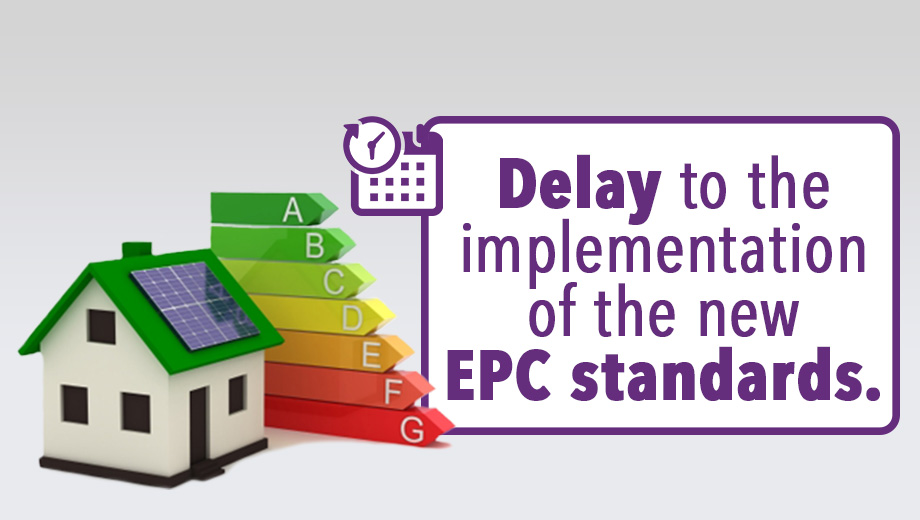The Scottish Government has announced a delay to the implementation of the new Energy Performance Certificate (EPC) standards. Homes in the private rented sector in Scotland will now have to meet minimum EPC standards by 1 October 2020, instead of 1 April 2020 as originally proposed, to give landlords more time to check their properties are compliant or to carry out remedial works to bring them up to standard.
What are the new standards?
It’s been a legal requirement since 2007 for all rental properties in Scotland to hold a valid EPC, which lasts for 10 years. Up until now there have been no repercussions for properties with a low EPC rating, however in a bid to help landlords reduce energy bills and to make properties more efficient, all rental properties will now have to meet a minimum standard of a band E rating.
EPC bandings
The energy efficiency of a property is graded anywhere from A to G; ranging from properties that are highly energy efficient (band A) through to properties that are way less energy efficient and so have higher running costs (band G). Each EPC also specifies the potential band a property could achieve if certain improvements were made to boost the EPC rating (improvements may relate to wall insulation, windows, lighting, etc).
Timings for the new standards
Ministers have approved The Energy Efficiency (Domestic Private Rented Property) (Scotland) Regulations 2020 and the new standards kick in on 1st October 2020. These only apply to properties where a new tenancy starts after October 2020, so immediate action is not necessarily required for properties that are tenanted and don’t need to be advertised for let. However under a Private Rented Tenancy (PRT) tenants need only provide 28 days notice of their intention to leave, so it would be sensible for landlords to take proactive steps now to avoid any delay when it comes to re-letting the property (after October 2020, if a property does not hold an EPC rating of E or above then it could not be advertised for let). If landlords fail to ensure a property’s EPC meets the minimum legal requirements, the landlord may be fined (upwards of £5,000)
Are there any exceptions?
The Scottish Government will publish draft guidance on 1st April 2020 to make sure all owners are aware of what’s required. It was proposed that there will be some exceptions to the regulations, including; when it’s not technically feasible to upgrade a property, due to the property’s structure or in circumstances where other owners in a block of flats refuse the works for common areas.
Any more changes coming?
For tenanted properties they have until 31st March 2022 to reach the all important band-E rating and from 1st April 2022 things are tightened up further with properties with new tenancies needing to be at least Band D (with tenanted properties having a little longer to catch up to Band D by 31st March 2025). Going forward, there’s no solid plans to increase the minimum standard any higher, but there are proposals for rental homes to reach EPC Band C by 2030, in cases where it’s feasible and financially viable.
Summary of timings
- 1st October 2020 – Advertised properties must have minimum band-E rating
- 1st April 2022 – Tenanted properties must have minimum band-E rating
- 1st April 2022 – Advertised properties must have minimum band-D rating
- 1st April 2025 – Tenanted properties must have minimum band-D rating
- 2030 – proposals (not confirmed) for rental homes to reach band C
Is there any advice or assistance for increasing an EPC rating?
The Scottish Government recommends Home Energy Scotland for free and impartial advice about energy efficiency and renewable energy technologies. The Energy Saving Trust also provides financial support for properties that need work to be brought up to the minimum EPC standard.
How is Umega working to ensure our properties meet the minimum standards?
We’re looking through our managed portfolio to highlight properties with an EPC rating below band-E. For these properties we will likely recommend a fresh EPC is carried out (at a cost of £65+VAT) to see if any recent maintenance work or change of circumstances has led to a higher EPC rating and to have an up to date list of suggestions to increase the EPC banding. Once we have this information we will make a proposal to each affected landlord individually of what works should be done, while taking into account any potential disruption to tenants and financial burden for landlords. In 2021 we will then move onto appraising properties with EPC ratings below band D to bring these properties up to standard before April 2022. Landlords with lower-rating properties (i.e bands F and G) should be prepared for potential financial outlay if, say windows or heating systems are the significant changes required to raise a property’s EPC rating.
